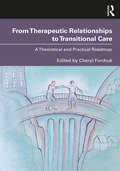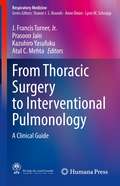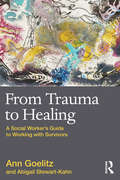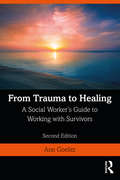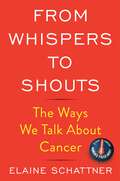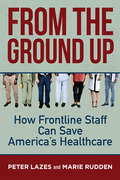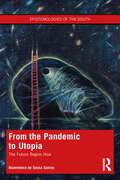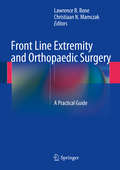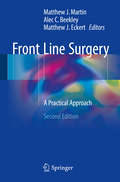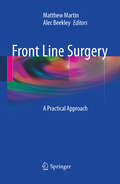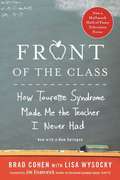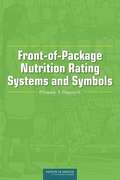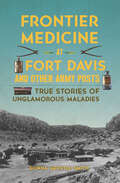- Table View
- List View
From Sugar to Splenda
by Bert Fraser-ReidMore than just coincidence connects a Tate & Lyle lawsuit and artificial sweetener to Jamaican-born Chemist Bert Fraser-Reid. From his first experience of Chemistry through his diabetic father, to his determination and drive as a Chemistry student in Canada, Fraser-Reid weaves a remarkable tale integrating science, law and autobiographical anecdotes. This book arises from the lawsuit brought by Tate & Lyle against companies accused of infringing its patents for sucralose, the sweet ingredient in the artificial sweetener SPLENDA which is made by chlorinating sugar. From a 1958 undergraduate intern witnessing the pioneering experiments on sugar chlorination, to being the 1991 recipient of the world's premiere prize for carbohydrate chemistry, Fraser-Reid was groomed for his role as expert witness in the mentioned lawsuit. Nevertheless, it seems more than his career links Fraser-Reid to the case.
From Sun to Sun: A Hospice Nurse Reflects on the Art of Dying
by Nina Angela McKissockTwenty-one people of different ages have one thing in common; they&’re within six months of their deaths. They&’ve endured the battle of the medical system as they sought cures for their illnesses, and are now settling in to die. Some reconcile, some don&’t. Some are gracious, some not. As Nina Angela McKissock, a highly experienced hospice nurse, goes from home to home and within the residential hospice, she shares her journey of deep joy, humorous events, precious stories, and heartbreaking love. Free of religiosity, dogma, or fear, From Sun to Sun brings readers into McKissock&’s world—and imparts the profound lessons she learns as she guides her beloved patients on their final journey.
From Therapeutic Relationships to Transitional Care: A Theoretical and Practical Roadmap
by Cheryl ForchukThis text provides a foundational understanding of therapeutic relationships and the transitional discharge model (TDM), a person-centered, evidence-based model that supports a smooth transition from hospital to community for people with mental illness Starting with background into the ground-breaking work of Dr. Hildegard Peplau, the mother of modern psychiatric nursing, and moving towards a transdisciplinary transitional discharge perspective, chapters introduce students and practitioners to theoretical, historical, and current perspectives on therapeutic relationships as they relate to transitional care. These perspectives foreground empirical research and practical applications that can be implemented in hospital and community settings. The Appendix features an essential "TDM toolkit" with forms, learning topics, and checklists developed by programs that implement TDM. Essential reading for those studying psychiatric nursing, this book combines theory, research, and best practices into a "roadmap" for students across nursing and psychiatric disciplines to coordinate these systems without having to implement radical changes to practice.
From Thoracic Surgery to Interventional Pulmonology: A Clinical Guide (Respiratory Medicine)
by Prasoon Jain Atul C. Mehta J. Francis Turner Jr. Kazuhiro YasufukuThis book provides an unbiased and evidence-based guide to the potential role of interventional pulmonology as an alternative to thoracic surgery. Interventional pulmonology is a new and quickly growing sub-specialty in pulmonary medicine and increasingly more pulmonologists are turning to interventional therapies over the more costly and invasive surgical options. The text thoroughly presents detailed coverage of and diagnostic methods for many diseases and conditions that pulmonologists encounter daily, including: diffuse lung infiltrates, solitary lung nodule, undiagnosed exudative pleural effusion, pneumothorax, hemoptysis, and airway foreign body. Experts then detail treatment options, from both a surgical and interventional perspective, with guidance on: when each procedure is most appropriate, what can be performed by a pulmonologist (with guidelines on how those procedures are done) versus what needs to be referred to a thoracic surgeon or an intervention pulmonologist, and the benefits and disadvantages involved with each option. This is an ideal guide for pulmonologists, trainees, and students to better understand the full scope of possible treatment options for their patients and to make the best informed decision about patient care.
From Trauma to Healing: A Social Worker's Guide to Working with Survivors
by Ann GoelitzFrom Trauma to Healing: A Social Worker’s Guide for Working With Survivors is the next significant publication on trauma in the field of social work. Since September 11 and Hurricane Katrina, social workers have come together increasingly to consider how traumatic events impact practice. From Trauma to Healing is designed to provide direction in this process, supporting both the field’s movement towards evidence-based practice and social workers’ growing need to be equipped to work with trauma. It does so in the practical-guide format already proven to be compelling to social work students, educators, and practitioners, providing case examples, and addressing social workers’ unique ecological approach.
From Trauma to Healing: A Social Worker's Guide to Working with Survivors
by Ann GoelitzThis updated edition of From Trauma to Healing is a comprehensive and practical guide to working with trauma survivors in the field of social work. Since September 11th and Hurricane Katrina, social workers have increasingly come together to consider how traumatic events impact practice. This text is designed to support the process, with a focus on evidence-based practice that ensures professionals are fully equipped to work with trauma. Highlights of this new edition include brand new chapters on practitioner bias and vulnerability, standardized assessment methodologies, and crisis management, as well as a focus on topics crucial to social workers such as Trauma Informed Care (TIC) and Adverse Childhood Events (ACES). The text also offers additional resources including chapter practice exercises and a sample trauma course syllabus for educators. With fresh examples and discussion questions to help deal with traumatic events in practice, including interventions that may be applicable to current and future 21st century world events, such as the coronavirus pandemic, From Trauma to Healing, 2nd edition remains an essential publication on trauma for students and social workers alike.
From Wedding Guest to Bride? (Night Shift in Barcelona #4)
by Tina BeckettYou&’re cordially invited to read three-time Golden Heart® Award finalist Tina Beckett&’s uplifting romance of unexpected love in this final story in the Night Shift in Barcelona series. Love was not on the doctor&’s mind……until now! When wedding guest Elena shares a mind-blowing kiss with sexy stranger Santiago, it&’s wholly out of character for the diagnostician… Elena shut her heart off to love when her childhood sweetheart walked away just as she faced a life-changing diagnosis. Still, she can&’t deny how refreshing it is to be with widower Santiago, who understands heartache more than anyone. Will he become her heart's safe haven?From Harlequin Medical: Life and love in the world of modern medicine.Night Shift in Barcelona Book 1: The Night They Never Forgot by Scarlet WilsonBook 2: Their Barcelona Baby Bombshell by Traci DouglassBook 3: Their Marriage Worth Fighting For by Louisa HeatonBook 4: From Wedding Guest to Bride? by Tina Beckett
From Whispers to Shouts: The Ways We Talk About Cancer
by Elaine SchattnerIt’s hard today to remember how recently cancer was a silent killer, a dreaded disease about which people rarely spoke in public. In hospitals and doctors’ offices, conversations about malignancy were hushed and hope was limited. In this deeply researched book, Elaine Schattner reveals a sea change—from before 1900 to the present day—in how ordinary people talk about cancer.From Whispers to Shouts examines public perception of cancer through stories in newspapers and magazines, social media, and popular culture. It probes the evolving relationship between journalists and medical specialists and illuminates the role of women and charities that distributed medical information. Schattner traces the origins of patient advocacy and activism from the 1920s onward, highlighting how, while doctors have lost control of messages about cancer, survivors have gained visibility and voice.The book’s final section lays out provocative questions facing the cancer community today—including distrust of oncologists, concerns over financial burdens, and disparities in cancer treatments and care. Schattner considers how patients and their loved ones struggle to make decisions amid conflicting information and opinions. She explores the ramifications of so much openness, good and bad, and asks: Has awareness backfired? Instead, Schattner contends, we need greater understanding of cancer’s treatability.
From a Fling to a Family (Twin Baby Bumps)
by Becky WicksIn this second installment of the Twin Baby Bumps duet by Becky Wicks, after a one-night stand with her colleague, a fertility doctor discovers she&’s pregnant with twins. But when she&’s already had IVF treatment, she soon finds she can&’t tell for certain whether her handsome doctor is the father… IS HE THEIR MISSING PIECE…? Fertility doctor Rose Carter&’s encounter with ob-gyn Dr. Lucas Bennett throws a wrench in her secret IVF plans. Rose gave up on love when she signed her divorce papers and is determined to become a mother alone. Only kind, caring Lucas challenges her stance on love and causes her to wonder if the perfect family she craves might be possible after all. Until she learns she&’s pregnant…but is Lucas the father of her babies or are they a result of the IVF?From Harlequin Medical: Life and love in the world of modern medicine. Twin Baby BumpsBook 1: A Daddy for Her BabiesBook 2: From a Fling to a Family
From an Association to a Royal College
by Alan Craft Keith DoddThis book describes the history of the Royal College of Paediatrics and Child Health (RCPCH) covering the period from 1988 to 2014, which includes the transition from the British Paediatric Association (BPA) to the formation of the now established RCPCH. The book contains a collection of viewpoints from paediatricians who held officer posts with the association and College through this time. The authors offer insights and reflections to help the reader understand where the College is at the moment on a variety of core paediatric issues, and significantly where it has come from. The formation of the RCPCH from the BPA was very controversial, with some members resigning from the RCP. Since then, the College has come a long way and is now recognised as the definitive body to speak for children's health in the UK and has forged relationships with many overseas countries. It has produced influential documents, and lobbied for advances in the practice of paediatrics. It has reported on standards for how children should be cared for in emergency and urgent care settings, launched policy to improve how children are looked after in the secure estate, and produced teaching and training materials for child protection among many other contributions to child health. Finally, it will be of interest to other Colleges and professional bodies as well as to Members and Fellows of the College.
From the Ground Up: How Frontline Staff Can Save America's Healthcare
by Peter Lazes Marie Rudden“Everyone in a hospital leadership role should read this book as it offers a wealth of practical advice for organizations intent on improving their clinical care delivery.” —Amy C. Edmondson, professor, Harvard Business School, and author of The Fearless OrganizationAll Americans deserve and should have access to high quality, affordable healthcare services delivered by professionals who have sufficient time and resources to care for them. This book offers proven and practical approaches for redesigning healthcare organizations to be less fragmented—and more patient-centered—by tapping into the experiences of staff on the front lines of patient care.Peter Lazes and Marie Rudden show how collaboration and active communication among administrators, medical staff, and patients are a core element of a successful organizational change effort. Through case studies and the direct voices and experiences of frontline workers, they explore exactly what it takes to effectively engage staff and providers in improving the patient care shortcomings within their institutions. This book not only is a manual detailing what can be achieved when frontline staff have a direct voice in controlling their practice environments but was written to show how to accomplish transformative changes in how our hospitals and outpatient clinics work. At a time when the massive gaps in our healthcare systems have been laid bare by the fragmented responses to the COVID-19 pandemic, this book offers hope and a plan for change.
From the Mental Patient to the Person: From The Mental Patient To The Person
by Robert Hayward Dr Peter Barham Peter BarhamThe aim of contemporary mental health policy is to enable people who have had a severe mental illness to lead relatively independent lives in the community, rather than be sequestered permanently in the large mental hospitals. In recent years plans to hasten the closure of many of these hospitals have become controversial and generated sharp debate about community care. From the Mental Patient to the Person contributes to this debate through an exploration of the experiences of a group of people with a history of schizophrenic illness, who are living in the community.
From the Pandemic to Utopia: The Future Begins Now (Epistemologies of the South)
by Boaventura de Sousa SantosThe coronavirus pandemic forces us to rethink our contemporaneity. It has brought to the surface dimensions of human fragility that partially contradict the euphoria and human hubris of the fourth industrial revolution (artificial intelligence). It has also aggravated the social inequality and racial discrimination that characterize our societies. The book argues that the virus, rather than an enemy, must be viewed as a pedagogue. It is trying to teach us that the deep causes of the pandemic lie in our dominant mode of production and consumption. The systemic overload of natural resources creates a metabolic rift between society and nature that destabilizes the habitat of wild animals and the vital cycles of natural regeneration whereby pandemics become an increasingly recurrent phenomenon. In trying to take seriously this lesson the book proposes a paradigmatic shift from the current civilizatory model to a new one guided by a more equitable relationship between nature and society and the priority of life, both human and non-human.
From the Watching of Shadows: The Origins of Radiological Tomography
by S. WebbFrom the Watching of Shadows: The Origins of Radiological Tomography presents the first complete history of body imaging by discrete sections, from its earliest beginnings around 1920 to modern times. Divided into two parts, the book is highly illustrated with many original figures from patents and some previously unpublished pictures. The first part covers classical tomography from 1920 to the 1960s, including the origins of radiological tomography. The second part takes a fresh look at computed transmission and emission tomography that includes recent developments by pioneering tomographers. Tables in each chapter summarize key historical landmarks. The book also includes an extensive glossary of technical terms and a comprehensive index. It is ideal reading for diagnostic radiologists and radiographers interested in the origins of their techniques, for practicing medical physicists, and for historians of medicine and science.
Frommer's Radiology for the Dental Professional
by Jeanine J. Stabulas-SavageThis full-color 10th Edition boasts new content on digital imaging, expanded information on radiation safety and infection control, plus updated new photos of the latest techniques and technology. New chapter summaries and review questions further reinforce your understanding and application skills, and feature boxes help you troubleshoot and prevent common errors.
Front Line Extremity and Orthopaedic Surgery
by Lawrence B. Bone Christiaan N. MamczakThis is an easy to read reference and practical guide to the management of combat extremity injuries, which account for a high percentage of the injuries sustained in recent and current conflicts. The surgical techniques appropriate to the full range of extremity injuries and some other frequent injuries, such as trauma to the spine and pelvis, are clearly described with the aid of helpful illustrations. In each chapter a "bottom line up front" approach is adopted, providing key messages first; a further important feature is the emphasis placed on case-based information and lessons learned from practice. Care has been taken to ensure that the advice provided is straightforward and in line with military clinical practice guidelines. This book, written by surgeons with experience in combat casualty care, will be relevant to all physicians working in forward surgical teams, combat surgical hospitals, or the "Charlie Med".
Front Line Surgery
by Matthew J. Martin Alec C. Beekley Matthew J. EckertThe second edition of Front Line Surgery expands upon the success of the first edition, providing updated discussion of practical management of commonly encountered combat injuries. This edition reflects the cutting edge of combat casualty care, refined principles of surgical management of specific injury patterns, and incorporation of the spectrum of recent research advancements in trauma care. Each chapter continues to follow the same organization as the first edition. The "BLUF", or bottom line up front, headlines each topic, providing the critical pearls for the reader, followed by a focused and straight forward discussion of management, pitfalls, and recommendations. In addition, select chapters conclude with a section discussing the application of this topic in civilian practice, as potentially encountered by the rural or humanitarian relief surgeon. Additional new topics include: REBOA and endovascular techniques for hemorrhage control, updates in transfusion and resuscitation practice, active shooter situations, rural trauma management in developed nations, advancements in prehospital care and the Tactical Combat Casualty Care (TC3) course, and discussion of the newest generations of topical hemostatic agents and tourniquets. These additions serve to both enhance the breadth and depth of the material relevant to military surgeons, but should also further expand the applicability and interest in this work to all civilian trauma surgeons.
Front Line Surgery
by Alec C. Beekley, MD, FACS Matthew J. Martin, MD, FACSBoth editors are active duty officers and surgeons in the U.S. Army. Dr. Martin is a fellowship trained trauma surgeon who is currently the Trauma Medical Director at Madigan Army Medical Center. He has served as the Chief of Surgery with the 47th Combat Support Hospital (CSH) in Tikrit, Iraq in 2005 to 2006, and most recently as the Chief of Trauma and General Surgery with the 28th CSH in Baghdad, Iraq in 2007 to 2008. He has published multiple peer-reviewed journal articles and surgical chapters. He presented his latest work analyzing trauma-related deaths in the current war and strategies to reduce them at the 2008 annual meeting of the American College of Surgeons. Dr. Beekley is the former Trauma Medical Director at Madigan Army Medical Center. He has multiple combat deployments to both Iraq and Afghanistan, and has served in a variety of leadership roles with both Forward Surgical Teams (FST) and Combat Support Hospitals (CSH).
Front Office Management for The Veterinary Team: 3rd Edition
by Heather PrendergastLearn to navigate the day-to-day skills you need to be a valuable member of the veterinary office team! Front Office Management for the Veterinary Team, 3rd Edition covers veterinary office duties ranging from: scheduling appointments to billing and accounting, managing inventory and medical records, marketing, using outside diagnostic laboratory services, and communicating effectively and compassionately with clients. This edition includes two all-new chapters on strategic planning and leadership, updated coverage of office procedures, veterinary ethics, and technology. In addition, this complete guide to veterinary practice management features step-by-step instructions, making it easier for you to master vital front-office tasks!
Front Office Management for the Veterinary Team
by Heather PrendergastThe only book of its kind, Front Office Management for the Veterinary Team focuses on the day-to-day duties of the veterinary team. It offers a complete guide to scheduling appointments, billing and accounting, communicating effectively and compassionately with clients, managing medical records, budgeting, marketing your practice, managing inventory, using outside diagnostic laboratory services, and much more. Written by Heather Prendergast, RVT, CVPM, this manual simplifies essential tasks with step-by-step instructions! Exercises on the Evolve website offer additional practice with front office tasks. Interactive working forms give you experience completing sample checks, deposit slips, patient history forms, and incident reports. The latest information on electronic banking and tax forms ensures that you adhere to the most current financial guidelines. What Would You Do/Not Do boxes provide scenarios to expose you to real-life situations that occur in veterinary practice and guide you through to an appropriate resolution. Review questions test your understanding of concepts presented in each chapter. Practice Point boxes highlight practical information to remember while on the job. Veterinary Practice and the Law boxes provide essential information about laws that you must know in order to run an ethical practice and to protect the practice. Key terms and learning objectives guide you through study of the most important content.
Front of the Class: How Tourette Syndrome Made Me the Teacher I Never Had
by Brad Cohen Lisa WysockyAs a child with Tourette syndrome, Brad Cohen was ridiculed, beaten, mocked, and shunned. Children, teachers, and even family members found it difficult to be around him. As a teen, he was viewed by many as purposefully misbehaving, even though he had little power over the twitches and noises he produced, especially under stress. Even today, Brad is sometimes ejected from movie theaters and restaurants. But Brad Cohen's story is not one of self-pity. His unwavering determination and fiercely positive attitude conquered the difficulties he faced in school, in college, and while job hunting. Brad never stopped striving, and after twenty-four interviews, he landed his dream job: teaching grade school and nurturing all of his students as a positive, encouraging role model.
Front of the Class: How Tourette Syndrome Made Me the Teacher I Never Had
by Brad Cohen Lisa WysockyThe inspirational story of how one man overcome his challenges with Tourette syndrome to become Georgia’s First Class Teacher of the Year.As a child with Tourette syndrome, Brad Cohen was ridiculed, beaten, mocked, and shunned. Children, teachers, and even family members found it difficult to be around him. As a teen, he was viewed by many as purposefully misbehaving, even though he had little power over the twitches and noises he produced, especially under stress. Even today, Brad is sometimes ejected from movie theaters and restaurants.But Brad Cohen’s story is not one of self-pity. His unwavering determination and fiercely positive attitude conquered the difficulties he faced in school, in college, and while job hunting. Brad never stopped striving, and after twenty-four interviews, he landed his dream job: teaching grade school and nurturing all of his students as a positive, encouraging role model. Now a Hallmark Hall of Fame Movie Event available on streaming platformsFront of the Class is now in e-book format for the first time and includes a new epilogue.
Front-of-Package Nutrition Rating Systems and Symbols: Phase I Report
by Institute of Medicine of the National AcademiesThe federal government requires that most packaged foods carry a standardized label--the Nutrition Facts panel--that provides nutrition information intended to help consumers make healthful choices. In recent years, manufacturers have begun to include additional nutrition messages on their food packages. These messages are commonly referred to as 'front-of-package' (FOP) labeling. As FOP labeling has multiplied, it has become easy for consumers to be confused about critical nutrition information. In considering how FOP labeling should be used as a nutrition education tool in the future, Congress directed the Centers for Disease Control and Prevention to undertake a two-phase study with the IOM on FOP nutrition rating systems and nutrition-related symbols. The Food and Drug Administration is also a sponsor. In Phase 1 of its study, the IOM reviewed current systems and examined the strength and limitations of the nutrition criteria that underlie them. The IOM concludes that it would be useful for FOP labeling to display calorie information and serving sizes in familiar household measures. In addition, as FOP systems may have the greatest benefit if the nutrients displayed are limited to those most closely related to prominent health conditions, FOP labeling should provide information on saturated fats, trans fats, and sodium.
Frontal Sinus Surgery: A Systematic Approach
by Devyani Lal Peter H. HwangThis state-of-the-art text addresses surgery of the frontal sinus, andthe challenges that come along with it. It provides a comprehensiveoverview of the anatomy of the frontal sinus and a systematic methodof approaching and executing sinus surgery, as well as tools, tips, andstrategies in optimizing success. Additional chapters include themanagement of acute and chronic frontal sinus inflammation, traumaof the frontal sinus, tumors in the frontal sinus, and pediatric frontalsurgery. Perioperative care and management of complications are alsodiscussed. Chapters are richly illustrated with fi gures and surgicalvideos, replete with practical pearls and tips. Frontal Sinus Surgery: A Systematic Approach will be an invaluableresource for general otolaryngologists and rhinologists interested inthe frontal sinus.
Frontier Medicine at Fort Davis and Other Army Posts: True Stories of Unglamorous Maladies
by Donna Gerstle SmithFrom a headless burial to cocaine toothache drops, the true stories hidden in the Wild West's medical records are a match for its tallest tales.In the 19th century, when dying young was a fact of life, a routine bout of diarrhea could be fatal. No one had heard of viruses or bacteria, but they killed more soldiers on the frontier than hostile raiding parties. Physicians dispensed whiskey for TB, mercury for VD and arsenic for indigestion. Baseball injuries were considered to be in the line of duty and twice resulted in amputations at Fort Davis. Donna Gerstle Smith explains how an industrious laundress could earn more than a private, how a female army surgeon won the Medal of Honor and how a garrison illegally hung the local bartender.


